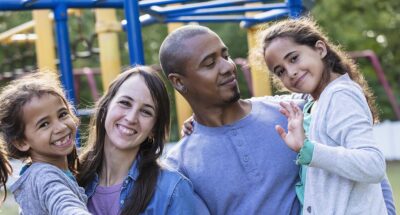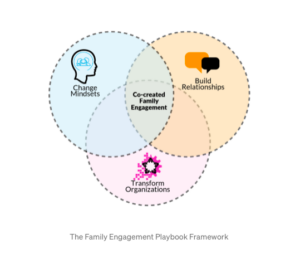

Module Introduction
According to research, certain factors may influence teacher beliefs about parents and families. For example:
- Teachers’ own sociocultural background and childhood experiences. “An assertive parent who is seeking to be a leader may bring about a defensive reaction” from a teacher whose own parents did not seek out leadership roles or who ceded decision-making to the educator.
- School culture and norms. If the school signals to parents that “their roles are limited and do not involve leadership then teachers receive distorted messages about how to approach and develop meaningful parent and family involvement.”
In this module we will:
- Explore strategies to build capacity as educators, schools, and districts alongside families to come together in partnership around students’ social, emotional, and academic growth
- Take the perspective of families—and how best we can honor their contributions and expertise about their own children through a diversity, equity, and inclusion lens
Parents as SEL Partners
Critical to viewing parents as authentic partners is rejecting the idea that families are deficient in their approach to supporting their student’s social, emotional, and academic development. We must refocus instead on leveraging strengths and building capacity. This includes letting go of inaccurate stereotypes about race and poverty, such as the beliefs that because lower income parents may have less time or flexibility to participate in school activities, they care less about their children’s learning or that parents of different races hold higher or lower expectations for their children’s achievement.
In One Dream, Two Realities: Perspectives of Parents on America’s High Schools, a report on parent engagement by Civic Enterprises, nationally representative interviews confirmed that regardless of socioeconomic circumstances, parents and caregivers all hold the same set of goals for their children. Further, “parents with less education, lower incomes, and children in lower performing schools, are most likely to see rigorous education and their own involvement, as critical to their child’s success.”
Just as we must focus on an assets-based approach to student social and emotional skill development, so too must educators and school systems work to create the conditions for true partnerships. Co-creating pathways for parents and caregivers to contribute their strengths and participate in their child’s education in ways that enrich the school community is a key partnership-building practice. Another key practice is applying a culturally responsive approach to building socially, emotionally nourishing relationships with families and communities.
Module Resources
This toolkit includes additional resources, including classroom lessons and practices, staff meeting activities, videos, podcasts, articles, and professional development opportunities, as well as supporting materials for group facilitation on the topic of "Supporting SEL through Family and Community Engagement".
Individual Exploration
- The Equitable Collaboration Framework was developed by the Equitable Parent-School Collaboration Research Project at the University of Washington’s College of Education, and is hosted on Organizing Engagement.

- The Family Engagement Playbook, created by the Global Family Research Project, “provides people, groups, and organizations with opportunities to explore new possibilities for building capacity to promote co-created family engagement.”

Reflection
- What was interesting or new to you?
- What from these frameworks could be used in your classroom or school context?
- Where do social and emotional competencies show up within these frameworks, implicitly or directly?
- What barriers exist in your classroom or school to adopting an equity-focused, co-creation approach to parent engagement as described in these framework examples?
- How might those be overcome?
- What is one key insight or take away from the framework you explored?
Family and Community Engagement from a Parent’s Perspective
Reflection
- What teacher beliefs does Choi perceive?
- How do SEL skills play a role in engaging successfully with families?
- What specific SEL skills are relevant to successfully adopting a culturally responsive approach to working with families?
- Consider your “belief system” about family engagement: What are your strengths in this area?
- Are there ways you could continue to explore your own mindset and beliefs about family engagement?
- What, in particular, would you like to continue to work on?
Leveraging the Knowledge and Experiences of Families and Community
Reflection
- What is one idea you want to try or learn more about?
Module Resources
This toolkit includes additional resources, including classroom lessons and practices, staff meeting activities, videos, podcasts, articles, and professional development opportunities, as well as supporting materials for group facilitation on the topic of "Supporting SEL through Family and Community Engagement".
A reflection activity to help you deepen your understanding of Social and Emotional Learning with families and community.
Group Facilitation
Before facilitating groups, spend time in individual exploration in order to experience and embody the learning. And if you haven’t yet explored our introduction to SEL in California, make sure you explore those resources, too.
County Office Spotlight
Explore resources for Professional Learning. The San Diego County Office of Education curated resources on FCE and SEL:
- Building Partnerships and Honoring the Contributions of Diverse Families (Slides 1-9) discusses cultivating welcoming environments for diverse families, tips on what, when, and how to share information about SEL with families, and starter ideas for including families in SEL efforts.
- SEL Strategies and Tips for Families (Slide 10-26) is a curated presentation for use with families at an engagement event that offers simple ways for families to support their children’s social and emotional development, an introduction to CASEL’s five core SEL competencies, and some SEL developmental milestones.
When facilitating groups, use the following resources:
This toolkit includes additional resources, including classroom lessons and practices, staff meeting activities, videos, podcasts, articles, and professional development opportunities, as well as supporting materials for group facilitation on the topic of "Supporting SEL through Family and Community Engagement".
A revisable, turnkey powerpoint slide deck to use for professional learning sessions on the topic of "Supporting SEL through Family and Community Engagement".
A powerpoint slide deck with welcoming and closing activities to include in professional learning sessions.
A reflection activity to help you deepen your understanding of Social and Emotional Learning with families and community.
Additional Modules
Supporting SEL through Family and Community Engagement
- Module 6.1 Exploring Family and Community Engagement with an SEL Lens
- Module 6.2 Building Partnerships with and Honoring the Contributions of Diverse Families
- Module 6.3 Listening and Communicating Effectively with Families
- Module 6.4 Expanded Learning and SEL: Collaborating Across In-School and OST Contexts
- Module 6.5 Aligning around SEL Through Community Partnerships

Do you want to dive deeper into the science behind our GGIE practices? Enroll in one of our online courses for educators!


Comments